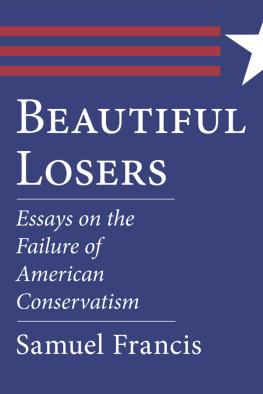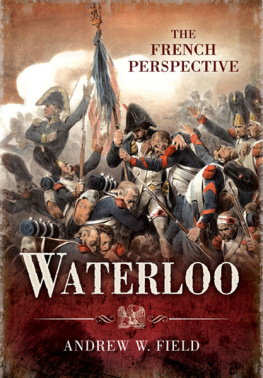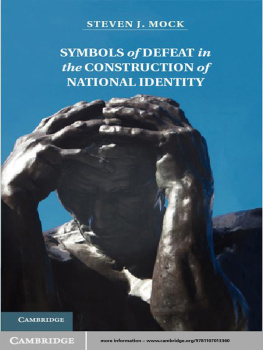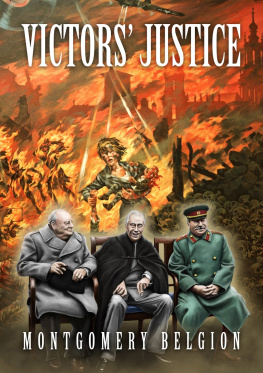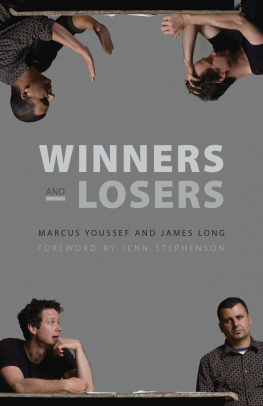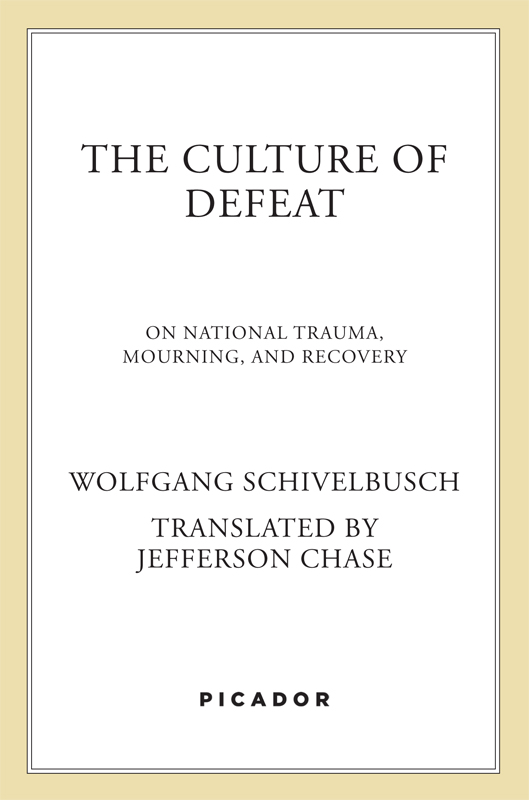
The author and publisher have provided this e-book to you for your personal use only. You may not make this e-book publicly available in any way. Copyright infringement is against the law. If you believe the copy of this e-book you are reading infringes on the authors copyright, please notify the publisher at: us.macmillanusa.com/piracy.
Contents
ancoruna volta per Emma
with thanks to Sara, Stephen, Riva, and Roslyn
Introduction: On Being Defeated
The vanquished are the first to learn what history holds in store.
Heinrich Mann
In the beginning was the fall of Troy, the prototype for all Western defeats. The ancient myths attest to how little the Greeks gained from their conquest: the victorious captains meet the death they escaped in battle (Ajax), are strewn about the globe for years (Menelaus, Odysseus), or return to their homes only to be murdered (Agamemnon). Troy is lost, its truebut with one crucial exception. The myths allow Aeneas and his family to escape and, after an odyssey of their own, to land on Italian soil and become the ancestors of the founders of Rome. Trojan lineage was an established part of Roman mythology even before Virgil used it as the basis for his national epic, the Aeneid, and after Romes own demise the founding myths of early medieval Western Europe adopted it as well. According to a sixth-century legend, France was founded by Francio, one of Priams sons, while England, if we believe Geoffrey of Monmouths Historia Regum Britanniae, owed its existence to Brutus, one of Aeneass grandsons and an early ancestor of King Arthur.
The myth of Troy as both an end and a new beginning is one of the many expressions of the ancient idea, common to all the worlds great cultures, that war, death, and rebirth are cyclically linked. The major myths of death and rebirth do not allow for absolute eradication. Life goes on in the afterworld much as it had in the realm of the living; it merely changes venue, as the philosopher Ernst Cassirer puts it. In many contemporary Western versions of the death-rebirth dynamic, negation appears as the driving force behind all progress. Without the eternally negating spirit of Mephistopheles, or the Hegelian antithesis, or the Freudian reality principle, there can be no Faustian bargain, no dialectical understanding of history, and no construction of the ego from the id. Defeat, at its most abstract, is nothing more than the negation of a will that has proven unable to realize its aims, despite using all the means at its disposal. Hegels maxim that world history is the court of world justice regards victory as a verdictthe end result of a previous strugglethat remains in force only until an opponents challenge begins a new struggle. Similarly, another Hegelian preceptthe real is the rationalapplies only for as long as the victorious side is able to assert its power. In the classical liberal system, the winners at any one point in history must always be prepared to face challenges from rivals, who are often yesterdays losers, whether the contest occurs in industry or the marketplace, in the world of fashion or ideas, in sports competitions or political elections.
To give up illusions of permanent triumph, to understand world history as a series of rises and falls, is to adopt the outlook of the jester Till Eulenspiegel, who relished the difficult path up the mountainside because of the easy downward slope that was sure to follow. The recognition that what triumphs today will be defeated tomorrow does more than just reverse the traditional tendency to identify with the great and powerful. Whereas the concept of hubris is primarily concerned with the demise of a supercilious and arrogant power, an empathetic philosophy of defeat seeks to identify and appreciate the significance of defeat itself.
There are two types of defeat empathy: the interested reflection of the vanquished themselves and the disinterested observations of third parties. A good example of the first is Carl Schmitt. Hitlers leading legal expert, Schmitt ended up as a defendant before a denazification tribunal. In the summer of 1946, he wrote an essay about Alexis de Tocqueville, whom he characterized as the paradigmatic loser: Every sort of defeat was crystallized in his person, and not just accidentally but as a kind of existential destiny. As an aristocrat, he lost out in the revolution. As a liberal, he anticipated the revolution of 1848 and its divergence from liberalism, and he was cut to the core by the onset of the terror he knew it would bring. As a Frenchman, he belonged to a nation that was defeated after twenty years of coalition warfare. As a European, he was again in the role of the defeated since he foresaw the development of two new powers, America and Russia, that would push Europe to the margins. Finally, as a Christian, he was overwhelmed by the scientific agnosticism of his era.
For Schmitt in 1946, Tocqueville was a great historian because he did not, like Hegel and Ranke, seat himself next to God Almighty in the royal box in the theater of the world but rather took his place among the ranks of the losing side. In 1934, when Schmitt, who drafted the legal justifications for the Night of the Long Knives, shared the box with Hitler, he no doubt saw things differently.
Some forty years later, Reinhart Koselleck drew a comparison between the historiography of victors and of the vanquished that reads like a paraphrase of Schmitts commentary on Tocqueville. While history may be temporarily made by the victors, who hold on to it for a while, Koselleck writes, it never allows itself to be ruled for long. Koselleck goes on to characterize victors history as short-term, focused on the series of events that, thanks to ones merits, have brought about ones victory. The historian who stands on the side of the victorious is easily tempted to interpret triumphs of the moment as the lasting outcomes of an ex post facto teleology. As examples, Koselleck cites Johann Gustav Droysen and Heinrich von Treitschke in Germany and Franois Guizot in France. The historiography of the defeated is another matter entirely: Their defining experience is that everything turned out other than they hoped. They labor under a greater burden of proof for having to show why events turned out as they didand not as planned. Therefore they begin to search for middle- or long-term factors to account for and perhaps explain the accident of the unexpected outcome. There is something to the hypothesis that being forced to draw new and difficult lessons from history yields insights of longer validity and thus greater explanatory power. History may in the short term be made by the victors, but historical wisdom is in the long run enriched more by the vanquished. Being defeated appears to be an inexhaustible wellspring of intellectual progress.
The Frondists, who opposed French absolutism and, after their defeat, traded the sword for the pen, were typical losers of this reflective sort. The memoirs and aphorisms of Saint-Simon and La Rochefoucauld were ultimately both a sublimated form of revenge and a social critique that led directly to the Enlightenment and the French Revolution.
* * *
DISINTERESTED OBSERVERS OFFER another kind of defeat empathy. Most prominently, these oberservers include the minority within the victorious nation who recognize the danger of hubris. The best-known expression of such a view is Nietzsches 1871 warning that great victories pose great dangers and that the triumph of the German empire would entail the demise of German culture. Arnold Toynbee, too, credits defeat with mobilizing the energies of a nation. In his system of Challenge and Response, defeat represents the stimulus of blows, one of the five stimuli that set historical action in motion.


